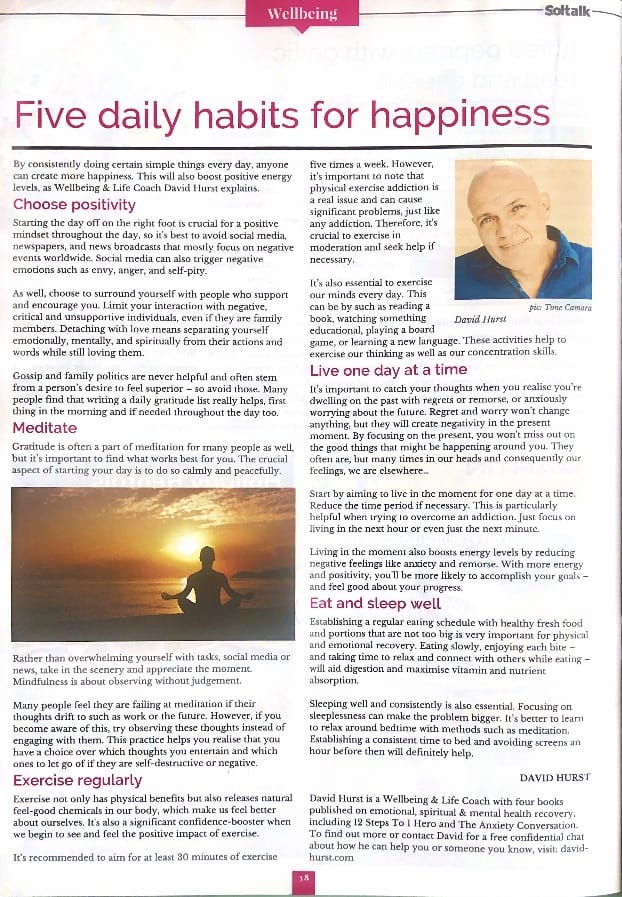There is a happy alternative – five daily habits for happiness

By consistently doing certain simple things every day, anyone can create more happiness. This will also boost positive energy levels.
Choose positivity
Starting the day off on the right foot is crucial for a positive mindset throughout the day, so it’s best to avoid social media, newspapers, and news broadcasts that mostly focus on negative events worldwide. Social media can also trigger negative emotions such as envy, anger, and self-pity.
As well, choose to surround yourself with people who support and encourage you. Limit your interaction with negative, critical and unsupportive individuals, even if they are family members. Detaching with love means separating yourself emotionally, mentally, and spiritually from their actions and words while still loving them.
Gossip and family politics are never helpful and often stem from a person’s desire to feel superior – so avoid those. Many people find that writing a daily gratitude list really helps, first thing in the morning and if needed throughout the day too.
Meditate
Gratitude is often a part of meditation for many people as well, but it’s important to find what works best for you. The crucial aspect of starting your day is to do so calmly and peacefully. Rather than overwhelming yourself with tasks, social media or news, take in the scenery and appreciate the moment. Mindfulness is about observing without judgement.
Many people feel they are failing at meditation if their thoughts drift to such as work or the future. However, if you become aware of this, try observing these thoughts instead of engaging with them. This practice helps you realise that you have a choice over which thoughts you entertain and which ones to let go of if they are self-destructive or negative.
Exercise regularly
Exercise not only has physical benefits but also releases natural feel-good chemicals in our body, which make us feel better about ourselves. It’s also a significant confidence-booster when we begin to see and feel the positive impact of exercise.
It’s recommended to aim for at least 30 minutes of exercise five times a week. However, it’s important to note that physical exercise addiction is a real issue and can cause significant problems, just like any addiction. Therefore, it’s crucial to exercise in moderation and seek help if necessary.
It’s also essential to exercise our minds every day. This can be by such as reading a book, watching something educational, playing a board game, or learning a new language. These activities help to exercise our thinking as well as our concentration skills.
Live one day at a time
It’s important to catch your thoughts when you realise you’re dwelling on the past with regrets or remorse, or anxiously worrying about the future. Regret and worry won’t change anything, but they will create negativity in the present moment. By focusing on the present, you won’t miss out on the good things that might be happening around you. They often are, but many times in our heads and consequently our feelings, we are elsewhere…
Start by aiming to live in the moment for one day at a time. Reduce the time period if necessary. This is particularly helpful when trying to overcome an addiction. Just focus on living in the next hour or even just the next minute.
Living in the moment also boosts energy levels by reducing negative feelings like anxiety and remorse. With more energy and positivity, you’ll be more likely to accomplish your goals – and feel good about your progress.
Eat and sleep well
Establishing a regular eating schedule with healthy fresh food and portions that are not too big is very important for physical and emotional recovery. Eating slowly, enjoying each bite – and taking time to relax and connect with others while eating – will aid digestion and maximise vitamin and nutrient absorption.
Sleeping well and consistently is also essential. Focusing on sleeplessness can make the problem bigger. It’s better to learn to relax around bedtime with such as meditation. Establishing a consistent time to bed and avoiding screens an hour before then will definitely help.

My latest article for Soltalk magazine.
